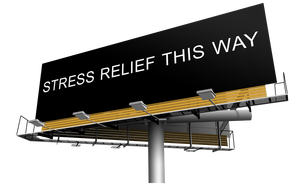 It is often that we hear people saying "I am so Stressed Out" or some other phrase of the same meaning, I have heard this said waiting in line at the grocery store, at work, in the gym, at the ATM and the list goes on and on. In the age of multitasking, most people at times feel as though they are overwhelmed by life, family, work or relationships. Here are 5 simple techniques that you can implement today in your life to reduce stress, the acronym is BREES 1. Breathe: Start by sitting in a relaxed position, either in a chair with your feet flat on the floor or lying down. Breathe in through your nose and out through your mouth. Take slow, deep breaths using your diaphragm. Take 30 breaths. At the end of this exercise you should feel less stressed and more relaxed. 2. Relaxation techniques: Progressive muscle relaxation involves tightening your muscles and releasing them. Start with your right foot, tighten the muscles in your toes and release them. Continue up your leg to your head, then go down your left side, from your shoulder all the way down to your left toes. Do not forget to tighten and release your midsection. This is for the whole body, not just the limbs. After trying this you should feel more relaxed. 3. Exercise: Research suggests that 30 minutes of Cardiovascular exercise 5 days a week will decrease stress and feelings of anxiety and depression. Exercise also aids with sleep, as long as you exercise up to three hours before you go to sleep. 4. Eating: Eating a healthy diet and keeping unhealthy foods to a minimum, will help with overall health and well being. I know it is difficult for some of us to eat healthy as we tend to crave "comfort foods" when we are feeling overwhelmed or stressed. This is when you should be making better food choices. Poor diet does not help reduce your stress level. You may feel satisfied for the time you are eating, but it takes its toll on your overall health, which can add to your stress level. 5. Sleep: Sleep is very important in reduction of stress. Sleep is very important for your body to function appropriately and to help you manage your stress better. The average adult needs 8 hours of sleep per night. Which means that some people need more to feel fully rested and other people need less. Know your body and how much sleep you need to feel fully rested. Not how much sleep you need to get through the day, there is a difference. If you are sleep deprived, you may rely on caffeinated products to help you perform or be more alert, and this may impact your sleep in a negative way as caffeine can cause sleep issues. For some people, caffeine can cause difficulty falling asleep, where you may feel alert and tired at the same time. If you are experiencing high levels of stress and difficulty with sleep, you may want to decrease your caffeine intake to alleviate stress symptoms as well as increasing sleep. It is important when feeling stress to get a full night's sleep. Disclaimer: Please check with your physician or health care provider before you begin an exercise program. This blog is for informational purposes only and is not meant to be a substitute for treatment or therapy.
1 Comment
Leave a Reply. |
AuthorDr. Deb is a successful Psychologist who practices in New York City. She is an Anxiety Specialist who works with adolescents and adults providing both individual and couples counseling. Categories
All
|
NAVIGATION
|
CONNECTSHARE THIS PAGE |
CONTACT MeDebra O'Shea, Psy.D PLLC
14 Penn Plaza New York, NY 10122 (347) 480-8095 |
LOCATIONWebsite by TherapyPrime
|
©2017 Dr. Debra O'Shea, Psy.D, PLLC

